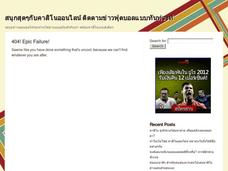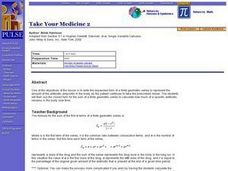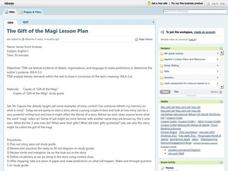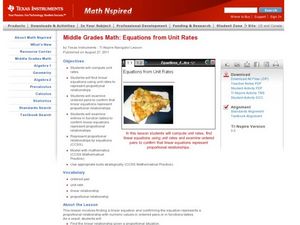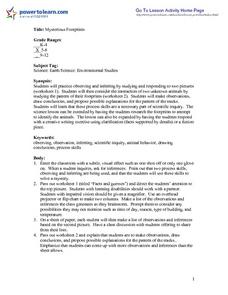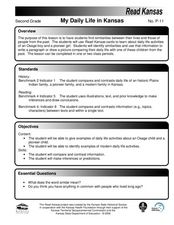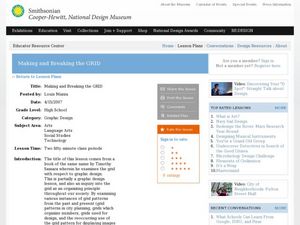Curated OER
World War II New Guinea Campaign
Although the big picture for this lesson on the New Guidea Campaign of WWII is taking a field trip to the Douglas MacArthur Memorial, you can easily use it as a guide to an independent or group research project as well. However, if you...
Curated OER
Models of Chemical Families
A simple activity for introductory chemistry classes is thoroughly explained in this lesson plan. Each individual receives a sealed box containing an unknown object. Inquisitors use indirect evidence to draw conclusions. This activity is...
Curated OER
Jumping Frogs - A Lesson on The Scientific Method
Students use origami frogs to experience the scientific method. They define different scientific terms. Also they test a hypothesis and draw conclusions from observations to go through all the steps of the scientific method.
Curated OER
Take Your Medicine 2
Real-world application of the finite geometric series. Sick? Need to take Ampicillin? How much is in the body at any given point in time as this medication is taken over the course of time. Use the formulas, make calculation, and graph...
Curated OER
The Gift of the Magi
Test the true meaning of giving - and irony - with this lesson plan about "The Gift of the Magi." Using textual analysis, details, and text organization, middle schoolers make predictions about future events in the story and determine...
Curated OER
What is the Average Height of Your Class?
In this statistics lesson, learners use an on-line form generator create a class-specific form, then complete the form, view a graph and data analysis, and draw conclusions.
Curated OER
Data Displays with Excel
Students collect and analyze data. In this statistics lesson, students display their data using excel. They plot the data on a coordinate plane and draw conclusion from their data.
Curated OER
The Dragonslayers, Chapters 9 & 10: Comprehension Quiz
Bruce Coville's fantasy novel The Dragonslayers (chapters 9 & 10) is the subject of 14 multiple-choice questions that deal with conflict, detail recall, sequencing, drawing conclusions, and identifying cause and effect.
Curated OER
Application and Modeling of Standard Deviation
The first activity in this resource has learners computing the mean and standard deviation of two different data sets and drawing conclusions based on their results. The second activity has them using a dice-rolling simulation to...
Curated OER
Investigating the Response of Worms to Soil Improvers
The worms crawl in, the worms crawl out, but do they care what soil is all about? Find out in an easy and fun controlled experiment. Have your young biologists hypothesize, test, and draw conclusions about which type of soil worms...
Balanced Assessment
Alcohol Level
How long does it take alcohol to leave your system? Individuals explore this question by examining a polynomial function. They draw conclusions by analyzing the key features of the given polynomial function.
Concord Consortium
Molecular View of a Solid
Why are solids, well ... solid? Take a peek inside a solid substance with an easy-to-use interactive. Science sleuths examine the motion and position of the atoms that make up a solid before drawing conclusions from their observations.
Curated OER
Equations from Unit Rates
Your class can become linear equations masters, as they calculate the rate of change of a function. They observe different types of coordinates as they relate to a graph, then use the Ti-navigator to move the line around and draw...
Curated OER
Ordering
Although there isn't much to this number ordering activity, it offers some solid practice in sequencing two and three-digit numbers. For each of the 20 sets of four numbers, learners re-write them in order from least to greatest. All...
Curated OER
EARLY CIVILIZATIONS
Students compare and contrast the monuments of four ancient cultures and draw conclusions about the origins, construction, and purposes of these structures.
Curated OER
Pick's Theorem
Students investigate polygons and their lattice. In this calculus lesson, students record data using different methods. They analyze their data and draw conclusions based on the relationship between the area and the interior lattice.
Curated OER
Mysterious Footprints
Learners, after observing and responding to two pictures, consider the interaction of two unknown animals by examining the pattern of their footprints. They make observations, draw conclusions and propose possible explanations for the...
Curated OER
Population Pyramids
Students utilize population pyramids to answer questions, make comparisons, draw conclusions and support predictions about the populations of China, India and the Unites States. They arrange numbers and symbolic information from various...
Curated OER
Canada's Constitutional Documents
Students analyze one major constitutional document and the events surrounding it. They examine primary sources (historical documents) and draw conclusions from evidence. Students write an essay and may prepare a presentation of their...
Curated OER
Jamestown's Economy
Students identify items made in Jamestown and draw conclusions about their economy. In this Jamestown economy lesson, students use the internet to complete a worksheet which required them to look at photographs of goods made in and...
Curated OER
My Daily Life in Kansas
Second graders use 'Read Kansas' cards to learn about the daily life activities of an Osage boy and a pioneer girl. In this similarities and differences lesson, 2nd graders write a paragraph and draw a picture comparing...
Curated OER
SUNSPOTS SPOTTED
Students study sunspots and their motion, from data gathered, they determine the significance of the sunspot data. The data be used to calculate the rotational period of the sun. They draw conclusions as to the sunspot's impact on the...
Curated OER
Health Care
Students analyze information and draw conclusions about the reality of human life expectancy; the battle between health care technology and our own internal time clocks. Students answer questions such as "Why does aging occur and can...
Curated OER
Making and Breaking the Grid
Students examine the grid in terms of a method of organization in our society as well as graphic design. In this "Making and Breaking the Grid" lesson, students design solutions to common problems and draw conclusions about patterns and...
Other popular searches
- Drawing Conclusions Reading
- Data. Drawing Conclusions
- Drawing Conclusions Lessons
- Drawing Conclusions in Reading
- Data Drawing Conclusions
- Reading "Drawing Conclusions
- Drawing Conclusions Worksheets
- Drawing Conclusions Science
- Drawing Conclusions From Text
- Drawing Conclusions Activities
- Drawing Conclusions From Data
